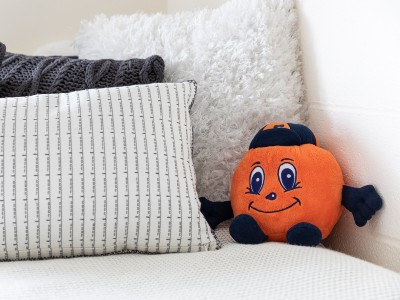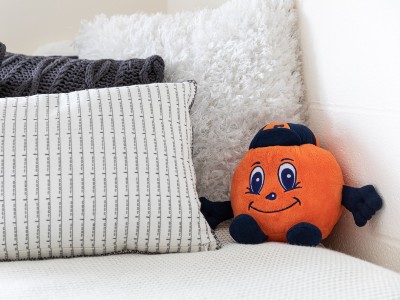Supporting Student Wellness Series: The Art of Sleep
Tucked between growing “to-do lists” that expand as the semester progresses alongside professional and personal responsibilities, the often familiar feeling of fatigue begins to creep into daily life. Then as fatigue meets the global community of constant connection and sprinkling of “hustle culture” messages, placing emphasis on achieving goals without always the partnering prioritization of health and wellness, it comes as no surprise that the necessity of sleep is often overlooked or completely neglected.
Why is prioritizing sleep important?
 “Sleep is essential to every process in the body.” Growing awareness and support of strengthening good sleep hygiene to enhance the student experience is one of the many topic areas covered by the Barnes Center at The Arch Students Advocating for Mental Health Empowerment (SAMHEs) peer education team. “It affects our physical and mental functioning, ability to fight disease, develop immunity, metabolism and more.”
“Sleep is essential to every process in the body.” Growing awareness and support of strengthening good sleep hygiene to enhance the student experience is one of the many topic areas covered by the Barnes Center at The Arch Students Advocating for Mental Health Empowerment (SAMHEs) peer education team. “It affects our physical and mental functioning, ability to fight disease, develop immunity, metabolism and more.”
At its core, sleep is an essential part of holistic wellness. When explored through a student-focused lens, sleep encompasses the Barnes Center at The Arch Dimensions of Wellness, with an emphasis on Physical Wellness, Environmental Wellness, Intellectual Wellness and Emotional Wellness.
What is good sleep hygiene?
Sleep hygiene is the culmination of assessing physical experiences such as nutrition and exercise, environmental experiences such as bedroom setup or technology habits, in addition to emotional strains such as stress, that all weigh into successful or unsuccessful sleep hygiene habits.
Good sleep hygiene is considered sleeping anywhere between seven to nine hours per night, while also being on a consistent schedule (waking up at and going to sleep at the same time–even on weekends).
Improving Sleep Hygiene: Sleep Audit
Students are encouraged to begin where each day ends, by auditing and adjusting sleep environments. Sleep solutions often change person to person, throughout the year and over a lifetime. Questions include:
- Is the space relaxing?
- Is the space dark?
- Is the space a comfortable temperature?
- If possible, have you removed technology (e.g. TVs, computers, smart phones) from the room?
- Have you reduced exposure to blue light/screentime at least 30 minutes to two hours or more before attempting sleep?
Moving past sleep environment, students are then encouraged to reflect on daily experiences surrounding mindfulness, movement, nutrition and more.
Improving Sleep Hygiene: Mindfulness
Feelings of overwhelm, uncertainty and stress may also negatively impact sleep hygiene. “Stress increases cortisol levels within the body, essentially triggering “fight or flight” response symptoms. With increased cortisol levels comes an increase in heart rate and blood pressure. This does the exact opposite of relaxing to prepare for sleep,” explains Alena Anthony, certified strength and conditioning specialist (CSCS) and Barnes Center associate director of fitness programs. Prior to bedtime, students should avoid activities that elevate cortisol levels and work to reduce stress with breathing exercises, meditations and more. Resources include:
- Headspace Mobile App: Customizable support surrounding bedtime exercises, sleep sounds, stress, meditation, movement and more.
- Wellness Leadership Institute: Workshop topics support holistic sleep hygiene.
Improving Sleep Hygiene: Movement
“Movement serves as a tool to regulate stress when used appropriately. Exercise releases serotonin, which improves mood. This diminishes production of stress hormones, keeping heart rate and blood pressure in a steady state, thus making it easier to relax. It’s important to note that while movement serves as a tool to regulate stress, movement itself does tax the energy systems of the body, meaning that it’s important to leave a few hours between workout and sleep to allow for recovery,” says Anthony. Customizable for a variety of interests and goals, highlighted movement resources are shared below.
- ‘Cuse Fit Chat (Free personalized meetings to support health and wellness goals.)
- Group Fitness Classes
- Fitness Facilities
- Outdoor Adventure Trips
Improving Sleep Hygiene: Nutrition
Sleep’s copilot when fueling daily life is nutrition. “They are interrelated and essential to physical and mental health. What we eat may influence sleep quality and duration. At the same time, how we sleep may alter our inclination to select certain foods,” shares Kristin Douglas G’04, registered dietitian nutritionist (RDN) and certified dietitian nutritionist (CDN). The following highlighted food habits and choice overviews may support sleep hygiene. For a personalized Barnes Center Nutrition appointment, please call 315.443.8000.
- Strengthen: High fiber, whole grains, starches, fruits, vegetables and unsaturated fats (e.g. nuts, seeds, avocados, olive oil).
- Weaken: Caffeine, alcohol, meal skipping, being hungry or too full at bedtime.
Contact the Barnes Center at The Arch for questions or if unsure how to begin strengthening sleep hygiene by calling 315.443.8000 or emailing BarnesCenter@syr.edu.
About the Supporting Student Wellness Series
Through a student-focused lens of integrated health and wellness, this series explores a variety of Barnes Center at The Arch resources and services. In the pursuit of enhancing the student experience, topics empower faculty, staff, students, families and supporters as catalysts of health and wellness within their daily interactions.



